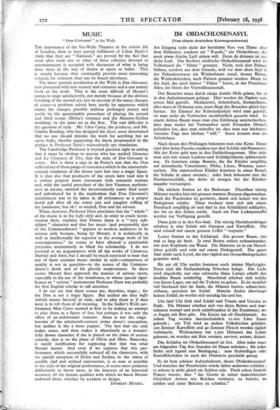MUSIC
"Don Giovanni" at the Wells THE importance of the Vic-Wells Theatres in the artistic life of London, their at least partial fuffilment of Lilian Baylis's zlaim that they are "National," are proved by the fact that week after week one or other of these columns devoted to entertainments is occupied with discussion of what is being done there in the way of drama or opera or ballet. This is simply because they continually provide more interesting subjects for criticism than can be found elsewhere.
The latest operatic production at the Wells is Don Giovanni, now presented with new scenery and costumes and a cast mainly fresh to the work. This is the most difficult of Mozart's operas to stage satisfactorily, not merely because of the obvious botching of the second act, nor on account of the many changes of scene—a problem solved here partly by apparatus which makes the changes possible without prolonged pauses and partly by the questionable procedure of playing the second and third scenes (Elvira's entrance and the Masetto-Zerlina wedding) on the same set as the first. The real difficulty is the question of style. Mr. Clive Carey, the producer, and Mr. Charles Reading, who has designed the decor, seem determined that no one should mistake the work for anything but an opera buffa, thereby supporting the thesis propounded in the preface to Professor Dent's miraculously apt translation.
The Cambridge Professor is beyond question right in stating that it must be obvious to anyone who has studied Idomeneo and La Clemenza di Tito, that the style of Don Giovanni is comic. Nor is there a sign in da Ponte's text that the Don suffered any of those pangs of conscience which in the nineteenth- century treatment of the theme turn him into a tragic figure. It is true also that producers of the opera have read into it a serious purport more consonant with romantic notions and, with the useful precedent of the first Viennese perform- ance as excuse, omitted the inconveniently comic final sestet and substituted for it the implication that Don Giovanni's punishment was to be taken in all seriousness as a proper moral pill after all the comic jam and naughty trifling of the handsome, but oh ! so wicked, Don and his servant.
When, however, Professor Dent proclaims that the " whole " of the music is in the buffo style and, in order to evade incon- venient facts, explains that Donna Anna is a "very sub- sidiary" character and that her music (and presumably that of the Commendatore) "appears to modern audiences to be serious only because, being by Mozart, it is technically as well as intellectually far superior to the average work of his contemporaries," he seems to have allowed a pardonable prejudice momentarily to blind his scholarship. I do not pretend to an acquaintance with all the works of Cimarosa, Martini and Sarti, but I should be much surprised to hear that any of them contains music similar in style—comparison of quality is not in question—to the scenes of the Conunen- datore's death and of his ghostly reappearance. In these scenes Mozart does approach the manner of serious opera, especially in the use of the trombones, to whose special signi- ficance as " serious " instruments Professor Dent was probably the first English scholar to call attention.
I do not say that these scenes are, therefore, tragic ; for the Don is not a tragic figure. But neither are they buffo (which means farcical) in style, and to play them as if they were is to rob them of all meaning. In the Sadler's Wells per- formance Miss Cross seemed at first to be making an attempt to play Anna as a figure of fun, but perhaps it was only the effect of an unfortunate costume. Anna is not the tragic heroine of the nineteenth-century prima donna's conception, but neither is she a mere puppet. The fact that she only makes sense, and then makes it abundantly as a wonder- fully drawn character, if she is played on the plane of serious comedy, that is on the plane of Olivia and Mme. Ranevsky, is surely justification for supposing that that was what Mozart meant. And even if we suppose that this per- formance, which successfully reduced all the characters, with the partial exception of Elvira and Zerlina, to the status of gaudily clad and stylised marionettes, is as near as possible to the style of the original performance, it seems mere pedantry deliberately to throw away, in the interests of an historical accuracy, all the human qualities with which we know Mozart endowed them, whether by accident or design.
DYNELEY HUSSEY.










































 Previous page
Previous page